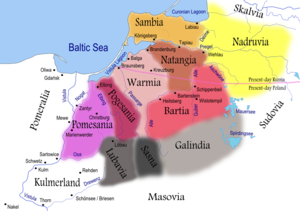- Natangians
-
Natangians 
Natangians and other Prussian clans during the 13th century Total population Extinct in 17th-18th century Regions with significant populations Natangia, East Prussia (now Kaliningrad Oblast, Russia) Languages Old Prussian, later also German
Religion Prussian mythology (Paganism)
Related ethnic groups Natangians or Notangians (Prussian: Notangi, German: Natanger; Lithuanian: Notangai) was one of the eleven clans of Prussian people, who lived in Natangia, an area that is now mostly in the Russian enclave Kaliningrad Oblast (East Prussia before 1945).
In the 13th century when the Teutonic Knights began their crusade against the Prussians, some 15,000 people might have lived in the area between the rivers identified by the Knights as Pregel (now Pregolya) and Alle (now Łyna).[1] The Natangian lands bordered with Sambia in the north and with Warmia in the south. They likely spoke a West Baltic language, now extinct, similar to Old Prussian language.
History
Natangians are first mentioned in a 1238 treaty between the Knights and Świętopełk II of Pomerania.[1] The Treaty of Christburg of early 1249, which assured personal freedom to newly converted Christians, included Notangians. However, the treaty failed to address the underlying causes of the conflict, and Natangians massacred 54 knights in the Battle of Krücken in November 1249.[2] But the victory was short-lived, the Knights regained their strength in just two years and continued their crusade. In 1255 they built Königsberg (now Kaliningrad) at the mouth of Pregel river, right on the border between Natangia and Sambia.
During the Great Prussian Uprising (1260-1274) Natangians elected Herkus Monte, who was educated in Germany, as their chief. At first he was successful and defeated the Knights in the Battle of Pokarwis and Battle of Löbau. However, the rebels were unable to capture the brick castles built by the Knights and lost their cause. Herkus, who became the most prominent leaders of the Prussians, was captured and hanged in 1273. The Natangian nobles submitted to the Germans, who promised privileges and undisturbed ownership of their estates. Natangians, led by Sabynas and Stanta, rebelled for the last time in 1295.[1]
When German colonists settled in the area, Natangians kept their local language and customs until the 17th century. Later on their identity disappeared at the end of the 17th century or beginning of the 18th century as they merged with German Population, but the local populace still defined themselve as "Natangians" up to 1945 and even the local Newspaper of Landsberg (Górowo Iławeckie) was called "Natanger Zeitung" after 1919. [3]
References
- ^ a b c Simas Sužiedėlis, ed (1970-1978). "Notanga". Encyclopedia Lituanica. IV. Boston, Massachusetts: Juozas Kapočius. pp. 101–102. LCC 74-114275.
- ^ Urban, William (2000). The Prussian Crusade (2nd ed.). Chicago, Illinois: Lithuanian Research and Studies Center. p. 242. ISBN 0-929700-28-7.
- ^ W. Reichermann, "Ut Noatange - Plattdütsche Spoasskes", Königsberg 1892, In Natangen - Ein Bildband, Kreisgemeinschaft Pr. Eylau, Verden 1986
Included by modern historians: Bartians · Nadruvians · Natangians · Pogesanians · Pomesanians · Sambians · Warmians
Included by Peter von Dusburg: Galindians · Kulmerland · Skalvians · Sudovians
Categories:- Baltic peoples
- People from Prussia proper
- History of Prussia
Wikimedia Foundation. 2010.
